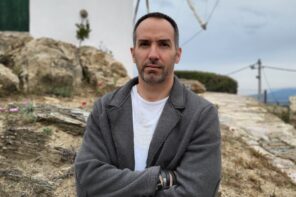One: To Bear, To Tend
Bear with me: I feel like a salmon flipping on a wooden cutting board. You might think about the implications of salmon being a health food or the image of a fish in air instead of water. Or you might ponder on the term helplessness, how it feels like a defining characteristic of this apocalypse.
Bear: to ask for patience is to ask a loved one to bear the weight of life with us. It is saying I know what I am about to say makes no sense, but if you will, please give an attempt at understanding. A tree bears fruits: it carries low-hanging fruits like children until they are mature enough to fall. How wonderful, to bear a life, to carry the weight of someone and to watch them fall.
There was a time when I frequently dreamed that everyone around me was dying, and you told me that it was because I love too much. You told me that the word tenderness includes the word “tend,” with the dictionary definition of “to move or to be inclined to move in a certain direction.” You told me that it demands effort to move towards a direction, and that is an expression of love. I am drawn to tending. Tending feels gentle. I interrogate its domestic connotations: what does it mean that I associate tending with baking a sheet of blueberry pie or the comfort of a blanket after it soaks up a belly full of sunshine? What does it mean that I associate it with a woman tending an open, reddened round?
I lie on the sofa; my loved ones walk in a circle around me. I used to drink vinegar when I felt bad, but an alternative to drinking vinegar is being held.
I am a tree hugger. There is one tree in a clearing of Kenyon College’s Brown Family Environmental Center to whom I pay frequent visits. It stands there, as trees do, and I look to it as a sign of permanence.
I want nothing more than somewhere to plant my vegetables and spices, somewhere to sit and gossip under fruit trees. I dream of having a garden, to have my next hyper fixation be extensive research on Indigenous plant species to the area. I tell myself that I would plant tomatoes, eggplants, and a small citrus tree when I get my own apartment, as if I don’t deserve life now that I don’t have permanence.
Two: To Plant, To Tame
I love the texture of the earth after rain, cold and wet. It’s like a brownie but better because it is not sweet or edible, and it nourishes innumerable microorganisms. Did you know that the human body is 20–30% fungi? Fungi produce psychedelics; our bodies also produce endogenous psychedelics. When trauma is stored in our bodies, sometimes these fungi would send us into a dissociated state to protect us, to carry the pain with us. Our bodies are not unlike these networks of fungi, these delicate systems that bear the weight of life with us. I like to whisper to the fungi living in my body, how we are sustained by them and how they live in us.
I have planted very few things: mint, bamboo, garlic, and green onion. It is more often that I collect things for the future, glass jars lying haphazardly in my drawer, empty of seeds, full of air, full of possibilities. My mother showed me her little garden on the balcony: bean sprouts, red peppers, and little oranges.
One of the things that I am most envious of X is the amount of vegetation she keeps alive: avocados, oyster mushrooms, even little pumpkins. Her cooking is delicious. As I thinly slice green onions, she puts the roots in the water, waiting for new lives to spring out. When I visit next week, the green onions have already grown to the length of my palm.
Anthropologist Sophie Chao’s works discuss how the violence of colonization not only murdered and displaced Indigenous people and communities, but also Indigenous plants and more-than-human-animal-species. It makes sense — when you massacre the stewards of the land, the land becomes dead and dying. I remember the word “planters” was at some point deemed the most accurate term for an absentee owner of an enslaving plantation. Except that word is not accurate at all. It does not only remove the violence they have done to enslaved individuals and communities, but also, on a very practical level, they did not do any planting. Another reminder that language can be violent by erasing violence.
To tend is not to tame. It is not to eradicate the wildness, but to embrace and nourish it. Many forces attempt to confuse the two. Too much “taming” is disguised as tending, and it makes you skeptical of gentle hands.
To tend is to regularly or frequently behave in a particular way or have a certain characteristic, as returned by a google search. To tend is to nurture our imagination, to tend a beautiful potential, even a beautiful mess. To tend is a renewal. To tend is a practice and it is a repetitive practice, a practice that takes lots of patience. I remind myself to be patient for a better world. We all need tending to become ourselves.
Three: Transplant
I attempted to describe myself as a transplant because all my life I have felt rootless. In one of my old poems I wrote, to be rooted without habituation. It was impossible. To be rooted requires repeated acts of planting. A mentor taught me that some plants can transplant themselves, making a strong argument for plant personhood. I picture a plant uprooting itself to find another soil when the existing ecosystem can no longer sustain it. It is beguiling to imagine humans as plants, but it makes sense since I left my soil.
I think about epiphytes — bromeliads, orchids, and ferns. They can be rooted almost anywhere, growing on the roots of other plants, but they are not parasitic. Epiphytes, or “air plants,” frequently appear in plant shops, awaiting to be homed, to be selected by humans. They don’t require soil to live, and perhaps it is easier to live that way, to not be grounded or attached to a piece of land. There is nowhere that I can claim indigeneity from, nowhere that I can root myself.
I imagine one day having one of these bromeliads by the window, its colorful petals in a white clay pot. Perhaps because my imagination is a colonial one, I feel a sense of sadness when I look at these plants about the concept of them being a decoration. There is nothing inherently negative about decoration — humanity has used plants and flowers to decorate houses since the dawn of time — but it upsets me when they are incorporated into a clean, minimalist aesthetic, when it reminds me of the capitalist, bureaucratic concept of permanence, or “stability.” Just like the concept of stability is built on colonial, capitalist lies, these air plants feel uprooted and unrooted. Their beauty preserves in a manner of a trophy being violently taken and stolen from somewhere and put in ceramic bowls for me to consume.
Or maybe it says more about my own bias, calling air plants unrooted. Maybe it is beautiful that epiphytes can grow on branches or piles of rocks, that they find home wherever they go. Maybe it is actually a progressive representation of interspecies kinship, living off the roots of other plants without causing harm and being nourished by them.
Chinese people love the soil: in the past, when young people went abroad to seek education, they would carry a bit of the soil of their motherland. We understood in our blood: 故土难离. One of the greatest tragedies is to leave your homeland. At the same time, staying would have been one of the greatest tragedies as well. To be a transplant is a lifetime of seeking permanence.
To consider the double meaning of “transplant,” gender in plants has completely different vocabularies than gender in people: “trans” plants commonly refer to plants that change reproductive systems seasonally or halfway through their lives, but the terms are fiercely and consistently debated by botanists still. “Gender” for plants is not social, but our anthropomorphic understanding of it is. My understanding of gender is inextricable from this land. I learned about the complexity and fluidity of my gender in the colonial language of English. I was frustrated with the concept that gender is something that one has to “figure out.” I was hurt by the suggestion of isolation in that theory. Gender is never individualistic; it is relational and communal. No plant exists in isolation; and neither do we. In other words, gender requires an ecosystem. Like any aspect about oneself, gender requires tending.
Four: Permanence
My friend S, an artist and sculptor who I greatly admire, despises the practice of permanent collection. We talked about our shared disdain towards the desire of leaving a legacy, and the flock of white men who use it as their main motivation for art. They chase victory like how they desire to conquer, they wish to leave a permanent mark in history as if the archives are manifested destiny rather than bundles of papers riddled with power and violence.
I sit in their studio, watching S cutting and stitching textile into horses. I ask about their goal for art, and they say boldly, “I want someone to replace me.” They want their works to be simultaneously an expression of selfhood and a stepping stone, a part of the current socio-political movement; later, there will be a different context, and different artists will shine. As I write this, S is preparing for their showing in Roy G Biv Gallery. Our conversation revolves around making it in the art world, what it means to have your work shown in white museum spaces, and how to survive as an artist. S makes a distinctively anti-canon argument: it doesn’t mean that we should forget people in the past. On the contrary, we should honor our artistic lineage by not putting them into permanence, even if the intention is to honor.
It makes me question the necessity, or the value of, permanence. A mentor introduces me to the plant Monotropa Uniflora, or ghost pipes. Ghost pipes do not photosynthesize, which makes it adopt a translucent white color, which is probably where it receives its naming. As an ephemeral plant, it embodies a fleeting, transitory love.
I used to perceive love as permanence. It is difficult to not see it this way. For every child who grew up in chaos, every transplant who dreamed of a permanent residence. It was a hard lesson to let go. My favorite number is nine, which shares a pronunciation with longevity in Chinese: 长长久久. It is difficult to not consider permanence as a form of longevity. Just look at the term permanent resident, and how many ways my mother has tried to obtain this permanence for me.
But I am learning to be more imaginative. Raymond Williams says that the structure of feelings is made dominant and that no one can escape ideology. I return to the works of Édouard Glissant and Priyamvada Gopal, specifically the concept of fellow feeling that is arrived through imagination work. It’s not simple as evoking compassion or humanity, but a project that counters the order of domination and subordination. If empire is a project of imagination — negative imagination, built on the premise of subjugation and the promise of greatness — let us counter it with a greater, more bountiful imagination.
A. Shaikh, one of the poets and friends I’ve adored since arriving at college, writes, What else is love if not a morning ritual: the promise to rise and then rise again. I don’t believe in the promise of greatness, but I believe in the promise to wake up for another day, to fall and to rise again.
Ocean Wei is a Chinese trans writer and an incoming MFA student at UBC School of Creative Writing. His works are in or forthcoming in Brevity, The B’K, en*gendered lit, Stone of Madness Press, and more. You can find him on social media at @_oceanwei or at https://linktr.ee/oceanwei.




